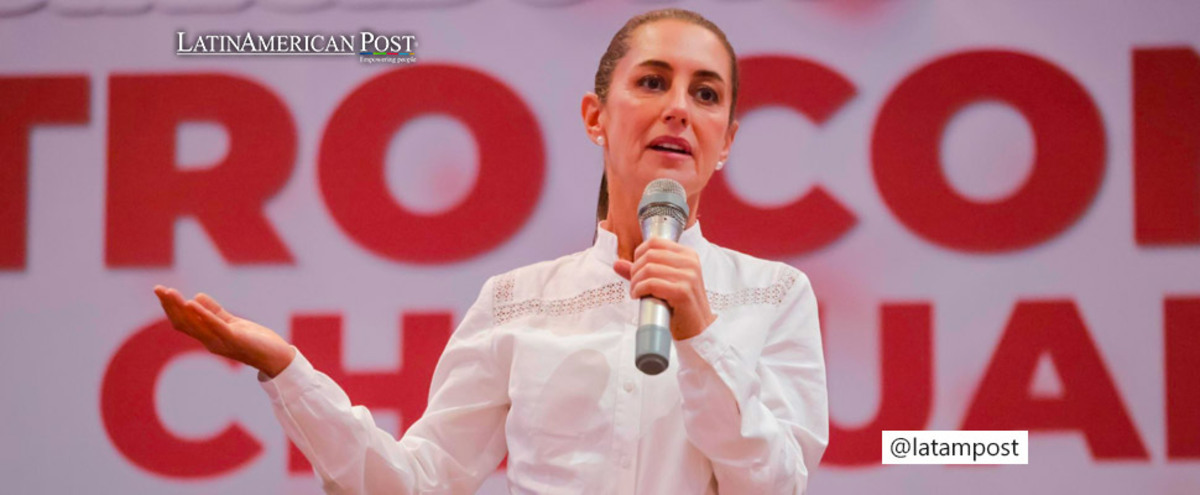Claudia Sheinbaum, the acclaimed scientist and politician, leads the race for Mexico's presidency in 2024, holding an 18-percentage-point lead over Xóchitl Gálvez, as revealed by El Financiero's latest national survey. Her ascendancy marks a pivotal shift in a political landscape historically dominated by male figures and traditional power structures

Photo: X/Claudiashein
The Latin American Post Staff
Escucha este artículo
Leer en español: Ascendiendo en las filas: Camino de Claudia Sheinbaum hacia la presidencia de Mexico en 2024
Heading: A Historic Ascent: Claudia Sheinbaum's 2024 Presidential Lead
Claudia Sheinbaum, representing the Morena-PVEM-PT coalition, is charting a historical path in Mexican politics as she takes a commanding lead in the 2024 presidential race. With a notable 46% in voter preference, Sheinbaum outpaces her closest rival, Xóchitl Gálvez, who trails at 28%, according to a national survey by El Financiero. The survey paints a dynamic political landscape, reflecting the complex tapestry of Mexico's evolving democracy and shifting public sentiments.
Subheading: A Strategic Alignment with AMLO
Sheinbaum's journey toward this prominent position is not just a political story but a tapestry woven with personal dedication, academic achievement, and a deep-rooted commitment to social justice. Her foray into politics was propelled by two decades of an academic career, shaped profoundly by her early exposure to political activism. Both her parents were deeply involved in the 1968 Mexican student movement, a pivotal moment in the country's history marked by the tragic Tlatelolco massacre. This backdrop instilled in Sheinbaum a strong sense of social responsibility and political engagement.
Her alignment with Andrés Manuel López Obrador (AMLO), a figure who has profoundly influenced Mexican politics, began in the 1990s. As AMLO ascended in politics, first as Mexico City's mayor and later as the President, Sheinbaum's career mirrored this trajectory. Appointed as Mexico City's secretary of environment and later elected its mayor, she has been an integral part of the political movement reshaping Mexico's governance landscape. Often seen as AMLO's protégé, Sheinbaum's policies and ideology align closely with his, focusing on anti-corruption and a more socially responsible government.
This alignment, however, has not been without criticism. Observers and political analysts have pointed out that Sheinbaum's adherence to AMLO's ideologies and policies might overshadow her political identity. Critics argue that this could undermine the progressive feminist values she champions, a critical aspect given her potential to become the first female president of Mexico.
Subheading: Divergent Stances: Fossil Fuels vs. Renewable Energy
In contrast to AMLO's heavy investment in fossil fuels, Sheinbaum, with her background in energy engineering, champions renewable energy, showcasing her willingness to carve out her distinct policy stances. Furthermore, her handling of the COVID-19 pandemic, advocating for strict health measures against AMLO's more lax approach, highlights her independent decision-making capability.
The electorate's current preference, as indicated by the El Financiero survey, favors Sheinbaum's approach, signaling a shift in public opinion and perhaps a desire for continuity with a nuanced change. This is particularly significant in Mexico's political history, where the Institutional Revolutionary Party (PRI) held power for over 70 years, followed by fragmentation and the emergence of new political forces.
Also read. Mexico says Colombia's Petro to join Migration Summit
Subheading: A Turning Tide in Mexican Politics
However, the political landscape in Mexico remains complex and dynamic. The opposition, though currently fragmented, has historically shown the capability to fuse and present formidable challenges. The upcoming election cycle is more than a contest of personalities; it reflects more profound societal shifts, concerns over governance models, and the ongoing debate between traditional politics and new paradigms.
As the race unfolds, Sheinbaum's position as a front-runner places her at the heart of these transformations. Her campaign and potential presidency will be a test case for the future of leftist politics in Mexico, the role of women in high political office, and the trajectory of the country's governance in an era marked by significant global and local challenges. With the Morena party's primary contest perceived as the real battle for the presidency, given AMLO's enduring popularity and influence, the outcome will be closely watched both within and beyond Mexico's borders. The political journey of Sheinbaum, a scientist turned politician, is not just about electoral numbers but also about the evolving narrative of Mexico's democracy and its place in the broader Latin American context.




